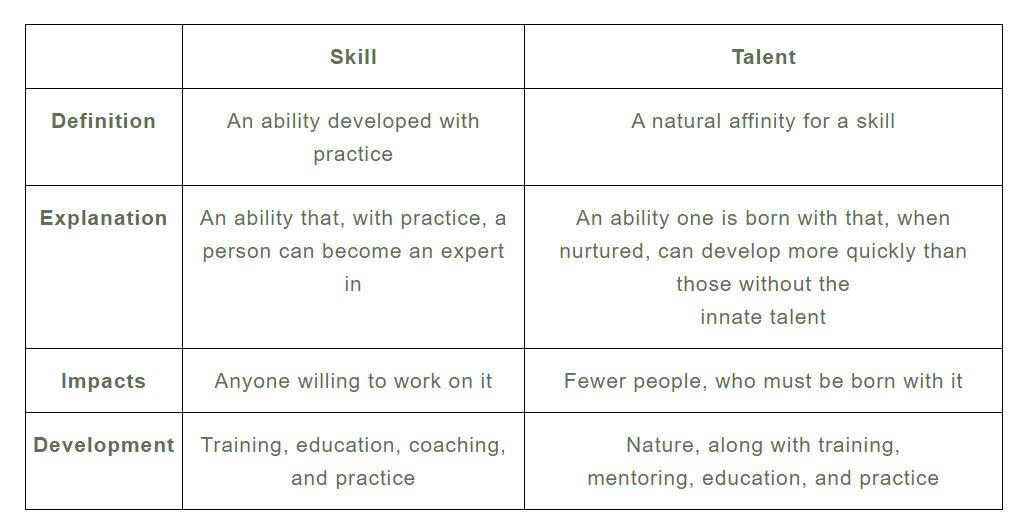Skill vs Talent: Do You Really Know the Difference? (& How Your Company Can Foster Both in Its Employees)

What’s the Difference Between Skill and Talent? A Comparison Guide
The definition of talent is a natural ability someone is born with, like a perfect pitch in music or a creative mind. Skill is an ability that comes from practice, something you can learn like computer coding or gardening. The key difference between them is that talent is God-given, and skill is learned.
Definitions, though, can trick us into thinking that complicated subjects are simple.
Don’t be fooled—there’s more to know about talent vs. skill. This article explores what these two things are and how to compare them, and gives examples. We’ll also discuss ways to develop talents and skills and how to use them in your career. (Learn about The Impact of AI on The Job Market: Key Insights.)

What is a skill?
Skill is the ability to complete a set of tasks well. Specific skills can be developed through hard work, training, and deliberate practice. For example:
Someone wanting a management position can take classes or training to develop competency in the skills they need to manage people and resources, like conflict resolution, strategic thinking, time management, delegation, and budgeting.
Computer programming experts learn their skills through coursework and by completing certifications.
Athletes (even naturally talented athletes) perfect their craft often through a lifetime of high-level practice and performance.
Hard skills like the ability to create or use software or other tools make up the majority of what many organizations focus on. These competencies are often critical to the core functions of the person’s role in the organization, and the organization in general.
However, soft skills are no less important. Soft skills are the interpersonal traits that allow a person to work well in a team. The ability to communicate well, excel in decision-making, and collaborate are all examples of soft skills.
Gaining and using soft skills can be more emotionally fraught than hard skills—which makes them in some ways harder to learn. But they can be learned and practiced and they offer adaptability in most professional settings. Taking seminars and classes, or working with mentors and coaches, to develop active listening, conflict resolution, and relationship building are good places to start.

What is a talent?
Talent is the natural aptitude to gain a specific skill or set of skills. Unlike skill, talent is a set of innate abilities, and is considered unteachable—but even talented people have to practice their skills!
Yo-Yo Ma once said in an interview with Strings Magazine that even he needs to practice after decades of playing. He said that if string musicians don’t play for a while, “We actually start from ground zero.”
People with an inborn talent for a certain skill often learn that skill more quickly and enjoy continuing learning long after their peers have given up. For example:
Someone with a natural aptitude for artistic talents might be able to master the use of products, colors, and lines for a role such as graphic design whereas it would take another person more time and effort to master.
Musicians are often described as talented but are often driven to practice their musical instruments or voice for hours on end. Some undefined part of their psyche attracts them to the music, and that they enjoy practicing allows them to perfect their craft.
People with a gift for numbers will often enjoy solving physics-related puzzles. They might not only enjoy the beauty of water dripping into a puddle, but will also ask themselves about the velocity of the waves that ripple out, and be drawn to practice their talent in places that other people don’t.
Talented people—in the arts, sciences, athletics, or anywhere else—often learn skills associated with their talent quickly, and feel drawn to their interests in a way that allows them to practice at a high level.

Comparison between skill and talent
This chart overviews the key differences between skill and talent, including their definitions, how they’re developed, and examples.

Types of talents
Now that we know the differences between them, let’s look at a list of talents and skills.
Examples of skills
You can develop any number of skills to serve you in life and your career. Just a few examples are:
Someone who's left-eye dominant but right-handed, learning to shoot a basketball well.
Someone who grew up learning to be independent, later learning to work in a team setting.
Someone who tends to think in black and white, learning to listen to and value the viewpoints of others.

Examples of talent
Like with skills, there are too many talents to list in one place. Below are just a few examples of God-gifted talent:
Someone who has never taken an art class finds they can practice sculpting for hours and develop a knack for it.
A business professional with a talent for launching new businesses who still practices developing basic skills like how they communicate with employees.
Someone who, from a very young age, has a natural affinity for certain subjects, for example physics, and can understand the concepts at a near-adult level.

Ways to develop skills and talents
People who don’t think of themselves as talented (even though they may be!) can overcome most of their deficits through quality practice. And even talented people can improve their technical skills! The extra effort it takes to improve is often worth it. We provide some ways to develop both.
1. Find a coach or mentor
First, expose yourself to the environment and a group of people that can help you grow your passion. Exposure, coaching, and the ability to share your experiences are key.
If you’re looking for someone to coach you, identify someone you admire or has common goals and ask for a meeting. Don’t be intimidated by the prospect of sending that initial email—they’ve likely been in your shoes. Ask for something quick, like coffee, that’s low stakes for them and an opportunity to see if you connect with them.
In that initial meeting, keep the conversation two-way—you want to try and get to know them. You’ll have an opportunity to see a little of their journey, and they’ll feel more invested in your relationship.
From there, maintain the relationship. Keep them updated when you follow their recommendations, offer to help them when opportunities arise, and continue to express your thanks for their time and guidance. Be open to different mediums of skill and talent development as your mentor suggests.

2. Practice
Practice helps build muscle memory, improve hand-eye coordination, increase focus and concentration, and develop the confidence needed to perform at our best.
Whether you want to write a novel or learn how to budget, the path is the same. When you regularly use a skill or talent, the stronger and more refined the special ability will get.
Ultimately, developing skills and talents through practice is about improving our abilities and enjoying the journey and the sense of fulfillment that comes with it.

3. Set goals to challenge yourself
You also need to set goals that challenge you. A good place to start is to follow the SMART goals method.
Specific. Drill down. For example, if you want to run a marathon, start by running a few miles.
Measurable. Track and confirm when you’ve reached your goal. For example, instead of saying you want to increase new customer acquisition, try saying you want to increase customer acquisition by 10%.
Attainable. Returning to our marathon example, you wouldn’t walk out the door on day one to run 26 miles. Set a goal you can achieve. Perhaps it’s running that first mile without stopping. Make sure your goal isn’t too much of a stretch so you don’t set yourself up for disappointment.
Relevant. Your goals should help you take steps to get where you want to be in your career and life.
Time-bound. Give yourself the benefit of a ticking clock to make progress. If you don’t, you may end up overwhelmed or put it off entirely.

4. Always keep learning
Developing skills and talents requires continuous education because the world is constantly evolving, your competition is always improving, and there’s always something to learn.
Continuous education helps us stay updated on the latest trends, technologies, and practices, allowing us to remain competitive and relevant.
This might mean returning to school for additional certifications or degrees, but it doesn’t have to. You can take advantage of online resources to continue to hone your abilities.

How to leverage both in your career
Leveraging your skills and natural talents in the workplace can benefit you and your organization. You improve your own impact, self-esteem, and career prospects—and your organization is stronger for your contribution.
But how do you go about leveraging your strengths? There are three main steps.
1. Know what your strengths are
Make a list of what you bring to the table, specifically what you are better than average at—the things that light you up inside and where you have found success and high performance.
Maybe it’s networking, communication skills, problem-solving, or project management. If you’re having trouble deciding what to put on your list, ask the people closest to you for their opinions.
Asking for others’ opinions is a good place to begin a conversation with your manager. It’s an opportunity to show that you’re invested in the company’s goals and that you want their buy-in when you create a plan.

2. Build your case
What would you say to support your claims if someone asked you in a job interview about your skills? If the strength you want to highlight is writing, what writing have you done to show what you can do?
Think about where you’ve demonstrated talent with particular tasks. The next step is to look at how these strengths fit into your current situation and evaluate what changes you might need to make and what you might still need to develop.

3. Plan ahead
From your list, you should know what you need to do to develop skills or make a case for how your skills can benefit your team. Showcasing and strengthening your talents and skills can help you find the right role from the beginning of your time with a company.
Beyond that, it’ll set you apart by increasing your productivity, motivating you to grow into your potential, and setting you up for more leadership positions. Put together an actionable, specific plan to move forward.
For example, suppose you want to earn a raise. In that case, your plan might include sitting down with your supervisor and discussing how these personal talents and skills benefit the company and how you’re growing into them to increase that benefit—which can help your manager see the benefit of keeping you on the team.
Understanding and leveraging your skills and talents are crucial to building a freelance career. You have to know what they are to create an effective service offering.
How will your strengths help you identify and assist potential clients? Clients want to hire experts who are always looking to improve and stay on the cutting edge of trends and technology.
This article originally appeared on Upwork.com and was syndicated by MediaFeed.org.

